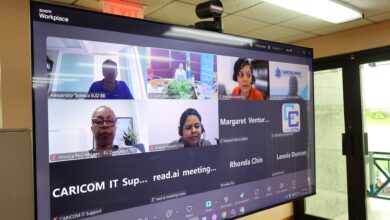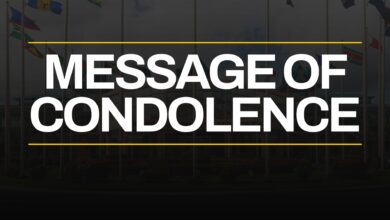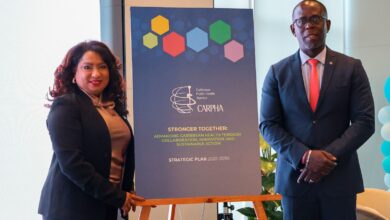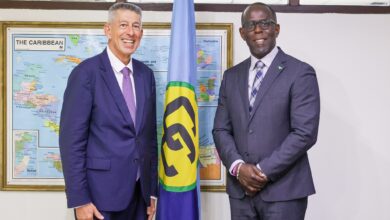(CARICOM Secretariat, Turkeyen, Greater Georgetown, Guyana) May I take this opportunity, Mr President, to express our deep gratitude to the Government and people of Equatorial Guinea for the gracious hospitality and profound generosity, extended to my delegation since our arrival.
My President, His Excellency Donald Ramotar is unable to join you today for reasons beyond his control. He has asked that I convey his deepest apologies as he was very much looking forward to being here today. He has also asked that I deliver this presentation on his behalf.
“I am strongly of the view that the outcomes of the deliberations and the Malabo Declaration must resonate with clear political commitments that will benefit the poor, hungry and exploited all across the Global South. This is how I understand the great challenges and enormous opportunities presented to us in the ACP Group of States at this historical juncture – more than three decades since we were born by the Georgetown Agreement of 1975.
The visionary leadership presented by our predecessors has borne great fruit and many achievements. These have no doubt been realised in good measure from the solidarity and unity we have displayed in joining forces at the highest level and mobilising the consciousness of our societies; as when we condemned apartheid in South Africa and supported the struggle to have it ended… and so it was!
Each in his or her own way firmly upheld the principle of self-determination and supported national liberation struggles for our brothers and sisters across Africa and so independence was won…for Mozambique, the very year the Georgetown Agreement was signed; so too for Cape Verde after 500 years of Portuguese rule; for Comoros, Sao Tome & Principe; so also for Papua New Guinea. Solidarity was present in the bitter struggle of civil war in Angola in which our brothers and sisters gave their lives to help a glorious victory against division and manipulation by external forces.
These and many more examples can be cited to confirm the power of solidarity and unified action.
Mr President, at present an array of new and emerging issues on the global agenda creates both challenges and opportunities for ACP countries. We see the disarray of the financial markets, the challenges associated with climate change, food and energy security, migration and geo-political alignments and tendencies of fragmentary forces that are trying to erect protectionist barriers in trade. Some countries aim to reinforce exclusive spheres of influence, while paying lip service to rules-based trade and want to impose conditions that give access to our markets but little in return for our development. These challenges should alert us in the ACP to strengthen solidarity around common causes.
Solidarity and unity of the ACP cannot be a message of convenience. It has to be demonstrated and deepened in practice, through Intra-ACP Cooperation, at the political level, in trade and investment, in effectively using development assistance to accomplish the Millennium Development Goals (MDGs), by cultural, scientific and technological cooperation.
(The ACP-EU Partnership)
At the core of the Georgetown Agreement, as revised in 2003, is the regard with which the ACP Group has attributed special significance to the Lome Conventions and the ACP-EU Cotonou Partnership Agreement of 2000 for a period of 20 years.
Moreover, within the Georgetown Agreement, which speaks of ensuring “the realisation of the objectives of the ACP-EC Partnership Agreements”, particular attention is given to “the eradication of poverty, sustainable development and the smooth and gradual integration of ACP States into the world economy”. These are the three pillars of the ACP-EU Partnership. The objectives are clear, straightforward and complementary. They entail a commitment and firm resolve that Heads of State and Government of the ACP endorsed from 1975 and in six subsequent Summits from 1997 to 2008.
Excellencies, Ladies and Gentlemen: the longstanding and privileged ACP-EU relationship is also challenged. The relationship once predicated on aid and preferential trade has shifted with great emphasis on “political dialogue” and reciprocal trade arrangements through Economic Partnership Agreements that remain contentious and of dubious value for poverty eradication.
With this in mind, this Summit has reason to seriously reflect and probe deeply into the extent to which “the eradication of poverty” and “sustainable development” as well as our “integration into the global economy” have been achieved. Such an assessment of our past and the nature, benefits and prospects of our partnership with Europe is all the more important as we approach the 2015 5-Year Review of the Cotonou Agreement.
(Follow-up Actions)
Deliberations have already addressed major concerns related to future ACP Trade and Development as well as measures for Development Finance to more effectively support the policies and strategies consistent with our national and regional goals – rather than those of external agencies and interests.
I however wish to refer to the progress made so far by the Working Group on Future Perspectives for the ACP Group. In this regard, my concerns are addressed to four aspects of both the process and content of the envisaged transformation of the Group as a whole and of the Secretariat, under the very able and distinguished leadership of Secretary-General Chambas.
Firstly, let me say that the Secretariat must be a dynamic, proactive knowledge management, nerve-centre of the organization and overtime become self-financing of its core operations.
Secondly, the question of financial sustainability of the organization needs to be addressed in a very objective, balanced, just and phased manner. I believe first and foremost must be the political commitment to live up to our assessed contributions, arrived at in a fair and progressive manner. Of course, the returns and benefits that come to our countries and regions have to be taken into account alongside the most efficient and effective use of our contributions.
The question of “financial sustainability” cannot be determined “here and now” or by a simple request for an increase in the proportion of the operational costs now dependent on 50% from the European Development Fund.
Since it is most likely that with the next EDF for 2014-2020 continued institutional support will be negotiated, this allows us a realistic period of seven years in which to design and adopt specific measures for improved financial sustainability of the ACP. I am proposing that this be a priority area on which the Ambassadorial Working Group must concentrate its attention.
Thirdly, we must deepen and widen the scope of engagement of the ACP as a Group and the promotion of Intra-ACP cooperation. This must address exchanges in the areas of trade and commercial linkages, technology transfer, agriculture and food security, cultural cooperation and south-south cooperation. A priority can be a specialized ACP Trade Financing Facility with technical assistance for sound investment proposals.
This also entails documenting and rigorous analysis of how ACP countries have exchanged their know-how and expertise, as for example by the Technical Aid Corps of Nigeria; by Cuba in the health and pharmaceutical sector and the current Sugar Research and Innovations Programme that benefits all 30 ACP sugar producing countries.
Many lessons can be derived to improve our development strategies and increase the quality of our absorptive capacity. We simply do not know enough of what each other has accomplished.
This leads me to the importance for the ACP to recapture its political resonance by enlarging our engagement through new and diversified partnerships. The numerical strength of 79 developing countries has to be marshaled and focused on critical issues that are affecting the daily lives of millions of people in the Global South. The opportunity to work in collaboration with the BRICS, for example, needs concerted attention.
Additional importance must be attributed to a suitable mechanism for collaboration with the Group of 77 to join in strong political advocacy on issues of mutual concern throughout the UN system. It is not enough for the ACP Group to have Observer Status in the United Nations but exercises only a periodic presence. How this is to be enhanced and on what issues of Global Governance and its systematic reform will require further thought.
Dear Mr President and Colleagues—we must be truly prepared to embrace a future for this great and glorious organization of the ACP Family in a manner that history will record with pride—the many millions of our citizens, and generations to come, expect no less as we set our sights beyond the Cotonou Agreement. Coming from the country which gave birth to the ACP I can ask no less.
I thank you.





